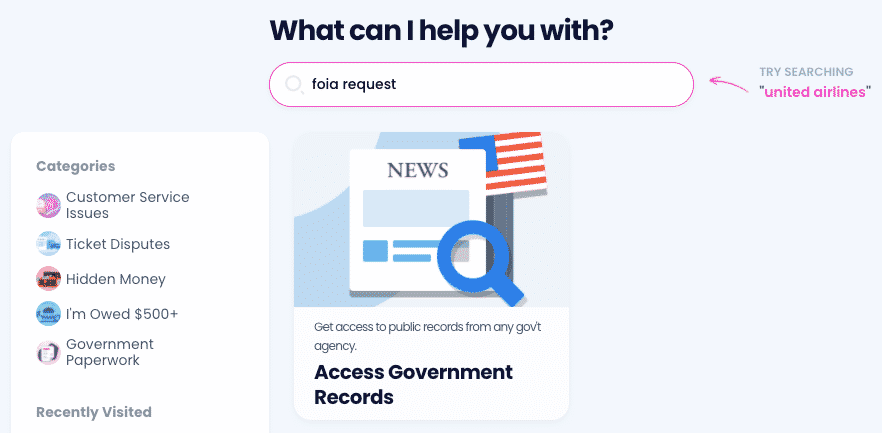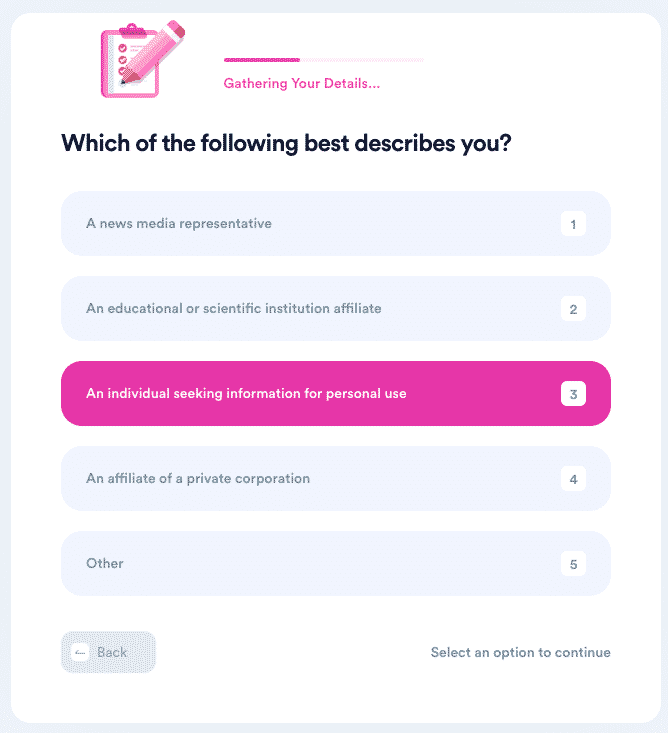The Essentials of the Freedom of Information Act of 1966
The Freedom of Information Act of 1966 (FOIA) is the first federal law that defined the transparency of government activities in the USA.
This guide will give you insight into the meaning and main characteristics of the FOIA enacted in 1966. You will learn more about filing FOIA requests and getting public information on yourself fast with DoNotPay. Our knowledge base is rich in tips for checking your request status, appealing an unsuccessful petition, and tackling other FOIA-related issues!
When Was the First Version of the Freedom of Information Act Introduced?
After more than ten years of struggle, the first official version of the FOIA was signed into law on the 4th of July, 1966.
A Brief History of the Freedom of Information Act
The fight for greater transparency began in 1952. A huge number of federal employees lost their jobs because the then-president claimed they were communists. The accuracy of these claims could be verified through certain records, but the authorities did not allow it.
After the incident, Congressman John Moss spent the rest of his mandate fighting for a more open relationship between the government and the citizens.
The law became effective in 1967. Many changes and amendments have affected it since then, including:
- Privacy Act Amendments of 1974
- Exemption 3 Amendment of 1976
- Executive Order Limit of 1982
- Omnibus Anti-Drug Abuse Act amendment of 1986
- Electronic FOIA Amendments of 1996
- Executive Order Limit of 2001
- Intelligence Authorization Act of 2002
- OPEN Government Act of 2007
- Executive Order, which permitted retroactive classification in 2009
- Wall Street Reform Act of 2010
Which President Signed the Freedom of Information Act in 1966?
Despite his hesitation to agree with the rules of the first FOIA, President Lyndon B. Johnson was the one who enacted this law.
Importance of the Freedom of Information Act
The meaning of the FOIA lies in allowing citizens to access and explore records of any federal agency. By advocating the enactment of this law, Moss enabled people who don’t participate in government directly to be informed of all government activities.
Thanks to the initiative that bore fruit in 1966, today people can request, investigate, and duplicate public records and use them for:
- Filing lawsuits
- Verifying identities
- Locating individuals
- Performing personal research
- Targeting interested citizens and consumers
- Writing academic studies and other similar forms
- Writing newspaper articles about government-related activities to help the public understand them
The Exemptions to Freedom of Information Act
Lyndon B. Johnson believed that a law like the FOIA would limit proper communication among government bodies. To prevent such situations, he based the initial FOIA version on nine exemptions to disclosure of certain types of information.
Their purpose has stayed the same to this day—they protect some records from becoming public to avoid harming national security.
The exemptions include records that:
- Protect national defense and foreign relations
- Refer to agencies’ internal personnel rules
- Are prohibited from disclosure by federal law
- Are provided by confidential or privileged people containing commercial and financial information
- Contain inter-agency or intra-agency privileged communications
- May bring harm to someone’s privacy if disclosed
- Refer to law enforcement
- Refer to financial institutions supervision
If the agencies realize certain public records belong to these groups, they have the right to withhold such documents. They can do the same with any public information which they believe may harm government interests.
What Are the Costs of Requesting Public Records?
The general FOIA rules state that agencies can determine request submission fees by estimating:
- Duplicating costs
- Time they need to gather the requested information
In most cases, institutions don’t charge requesters for the first two hours of search or the first 100 physical copies of the chosen records.
How Can You Request Records Under the FOIA on Your Own?
All agencies that provide public records upon demand have their preferred request methods. The best way to find out how to submit a petition to an institution is to explore state-specific FOIA handbooks or check the institution’s website.
FOIA handbooks contain all the information you may need before, during, and after the request procedure. At times, they also contain templates and ready-made request forms.
| Can You File a FOIA Request Via | Yes/No |
| DoNotPay | Yes |
| Yes | |
| Phone | Yes |
| Chat | No |
| Letter | Yes |
| In Person | No |
| Online Form | Yes |
How To Submit a FOIA Request Using DoNotPay
Demanding public records is a bureaucratic task, which implies it may take a lot of time and effort. If you need various kinds of information, the real struggle begins when you realize you need to contact more than one agency.

DoNotPay is a unique way to submit your FOIA petition in no time. The best side of our service is that you don’t need to write anything on your own. We will create a request letter using the details you disclosed and address it to the institution which holds the desired records.

Here are the steps you need to follow to send a FOIA request with our help:
- Access DoNotPay from any
- Use the search box to locate our FOIA feature
- Tell us whether you want the records from a state or federal agency
- Input the agency name and titles or descriptions of the desired records
- Specify whether you need fee waivers or expedited processing
Keep Your Requests on Point With Our App
can assist you in demanding public information from any state or federal agency in Florida, Indiana, Maryland, Massachusetts, or any other part of the USA. Use our help to get the record from numerous famous institutions, such as:
Our AI Consumer Champion Gets Rid of All Admin Tasks
What makes DoNotPay so unique is that it helps you get back what is rightfully yours in many different ways. You can appeal parking tickets, find unclaimed money, demand a refund for canceled or delayed flights, get help with bills you cannot pay, or get your college application fees waived with the help of our platform.
If you’re sick and tired of annoying robocalls, spam emails, copyright violations, text message spam, or stalkers and harassers, DoNotPay can assist you in getting rid of them once and for all
DoNotPay Can Help You Save Money
Have you ever subscribed to a service’s free trial you forgot about after a few days? Many Americans have, which is why DoNotPay has a free trial feature that will help you avoid getting charged once the trial is over.
If you want us to scan all your active memberships and help you not pay for the ones you don’t use, connect your email address or credit card to DoNotPay. Our cancel feature will ensure that you don’t waste your money on subscriptions you don’t even remember exist.
If a merchant charges you once the free trial is over, though, you can use our AI Consumer Champion to request a refund and skip the phone queue when doing so.
In case a company refuses to grant you a refund, you can also use our app to send demand letters to them in small claims court.


